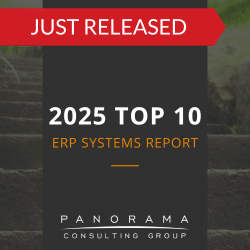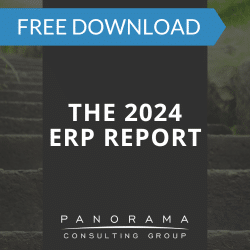In an ERP implementation, your software vendor can be your greatest ally. However, there can be circumstances that strain this relationship and lead to conflict.
If you find yourself embroiled in ERP vendor disputes, it can lead to setbacks, delays, and cost overruns.
Today, we’re discussing common issues that cause disputes to arise and sharing ways to prevent them in the first place.
What do ERP Vendor Disputes Typically Look Like?
Not every ERP implementation dispute will begin the same way. Still, there are some common characteristics that many of them share.
1. Misrepresented Experience or Skill Sets
It’s common for vendors to overemphasize or even exaggerate their experience or skills in order to win a deal. Often, this deceit doesn’t become obvious until the effort is well underway.
Sometimes, companies hire a particular vendor because they said they were well-versed with the industry in question. Other times, they move forward because the vendor allegedly had specialized skills in implementing a certain kind of software.
If either of these claims turns out to be false, it can derail everything.
For example, the vendor could return with their own claims of misrepresentation. They might complain that the customer’s project team wasn’t available when needed, or that their own team members had a limited understanding of the business.
A Failed Payroll System Implementation
Panorama’s Expert Witness team was retained to provide a forensic analysis and written report to the court regarding the failed implementation of a major software developer’s ERP/payroll system.
2. Misrepresented System Functionality
Disputes can arise when the ERP technology doesn’t deliver the results the customer expected. When this is the case, the customer might allege that:
- The software doesn’t work as advertised or represented
- The software doesn’t meet their business needs
- The software doesn’t deliver the basic functionality they expect
- The software doesn’t deliver industry-specific features
Typically, vendors will push back against these claims.
For example, if a customer claims that the ERP software was inaccurately portrayed, the vendor might retaliate by explaining that:
- The software met all acceptance testing criteria
- The software operates per the documentation
- The software works as warranted
- The sales process was transparent at every turn
- The customer has unreasonable expectations about the software
3. Inoperability Post Go-Live
There may be times when an ERP project goes relatively well right up until the go-live date. Then, the customer becomes aware of issues that render the ERP solution inoperable.
For example, a company may find that they’re unable to use certain functions (e.g., shipping and invoicing), or that the software won’t allow them to comply with industry regulations.
Such limitations can cause issues such as:
- Continuous loss of revenue
- Reputation loss
- Customer loss
If this is brought to the attention of the vendor, the vendor might try to deflect attention to external influences that could affect software functionality, such as:
- A lack of internal business process reengineering
- A lack of organizational change management
Common Reasons for Vendor Disputes
How do ERP vendors get away with misrepresentation in the first place? Often, it’s because of a lack of due diligence on the part of the customer. Here are some of the most common mistakes ERP customers make.
1. Accepting Vague or Incomplete Contracts
Many organizations fail to set clear expectations from the beginning. As a result, if anything goes awry, they have no firm commitment in writing and cannot hold the vendor accountable.
In contrast, an organization that takes the time to read an ERP contract line by line, has the opportunity to make modifications as necessary to ensure the company’s functional and technical needs are fully represented.
2. Moving Forward Without Proper Research
As mentioned, many ERP vendor disputes happen when a customer feels they were misled or oversold on the software.
While this may be partially true, the customer may be at fault, as well, because they rushed the ERP vendor research stage.
For example, they might have chosen a particular ERP system because their peers were using it without confirming it was the right fit for their own company.
3. Ignoring People and Processes
Many ERP implementation issues come down to a lack of business process management and a lack of organizational change management. This is often a direct result of accepting an ERP vendor’s statement of work (SOW) at face value without realizing that just because they didn’t include something in the SOW doesn’t mean it’s not essential.
How to Avoid ERP Vendor Disputes
ERP failure and related legal battles should be avoided if at all possible, so it’s best to prevent vendor problems before they begin. Here are a few ways to do so:
- Be as specific as possible in all ERP contract terms and licensing agreements
- Read and thoroughly understand all legal documents before a project kicks off
- Ensure all software demos represent current system capabilities
- Clearly define system requirements and user scenarios
By doing your due diligence at the start of an ERP project, you can clear up any fuzzy details and make sure your vendor knows what you expect from them.
Start Off on the Right Foot With Your ERP Vendor
ERP vendor disputes can be an early warning sign of ERP failure. In other words, if you’re making claims against your vendor, this is a sure sign that either or both parties have made a misstep that needs to be addressed before it spirals into project failure.
Other times, vendor disputes arise after go-live when it’s too late to rework your ERP selection process.
In either case, our ERP consultants can help you resolve disputes and get your project back on track. Alternatively, if you haven’t begun software selection, we can help you take the right selection approach and avoid disputes to begin with. Contact us below for a free consultation.














